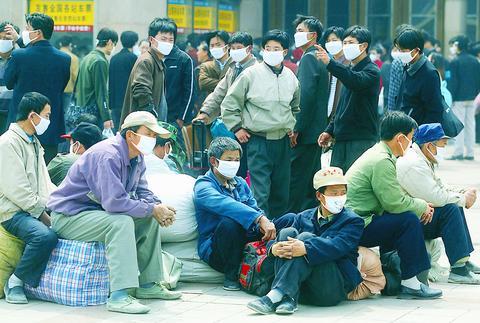The price of many staple foodstuffs has more than doubled in China's capital as residents stock up, alarmed by rumors that much of the city will close down due to atypical pneumonia.
In the Jingkelong supermarket, a popular chain in Beijing, eggs that cost 1.8 yuan last week are now 3.5 yuan (US$0.40).

PHOTO: REUTERS
In the Huapu supermarket, onions now cost five yuan, five times the published price a week ago. Tomatoes have increased by 30 percent.
"The majority of prices are stable and the Communist Party will not let people die of hunger, but the government should not let them raise prices like this," said Wang Jian, an elderly man who complained the panic buying was an overeaction.
"Look at me, I do not carry a mask, it is ridiculous that all these people are stocking up. It's an overreaction," he said.
The rush on supermarkets started earlier this week as the rumor mill ground out reports that trains would stop running to Beijing, and the city of 13 million would be isolated with tough new quarantine measures in place.
"The panic started Tuesday afternoon. They are pouring in," said a cashier at a supermarket in eastern Beijing. "I'm buying this stuff because I heard the city is going to be isolated," said one elderly shopper.
It follows the government's admission that the extent of the severe acute respiratory syndrome (SARS) epidemic was far worse than it initially admitted, with the numbers of confirmed cases in Beijing jumping from 44 to 774 in a matter of days.
Add to that 39 deaths and Beijingers are a bag of nerves.
The rumors have been categorically denied in the state-run press, but many Beijing residents do not believe the rhetoric nor assurances from the government that shops will remain open and fully stocked.
Earlier this week, the government said it was urgently working to check price rises by launching a nationwide check on excessive charges for drugs and staple foodstuffs.
The State Development and Reform Commission said in an emergency notice that it would "severely punish" those profiting from SARS fears, but it appears not to have stopped vendors.
After disappearing from shops during the week as demand soared, many products have reappeared but at prices considered to be prohibitory.
At a market in Yonganli district, the price of green vegetables has doubled, and in some cases tripled, customers complain.
"I'm buying all this because then I will then not need to leave home," said one woman as she loaded her car with crates of vegetables and fruit.
The price of rice has also doubled in some street markets, if it can be found.
Many people complain it has become difficult to find basic products like rice, oil, noodles, sugar and salt

SILICON VALLEY HUB: The office would showcase Taiwan’s strengths in semiconductors and artificial intelligence, and help Taiwanese start-ups connect with global opportunities Taiwan has established an office in Palo Alto, one of the principal cities of Silicon Valley in California, aimed at helping Taiwanese technology start-ups gain global visibility, the National Development Council said yesterday. The “Startup Island Taiwan Silicon Valley hub” at No. 299 California Avenue is focused on “supporting start-ups and innovators by providing professional consulting, co-working spaces, and community platforms,” the council said in a post on its Web site. The office is the second overseas start-up hub established by the council, after a similar site was set up in Tokyo in September last year. Representatives from Taiwanese start-ups, local businesses and

EXPRESSING GRATITUDE: Without its Taiwanese partners which are ‘working around the clock,’ Nvidia could not meet AI demand, CEO Jensen Huang said Taiwan Semiconductor Manufacturing Co (TSMC, 台積電) and US-based artificial intelligence (AI) chip designer Nvidia Corp have partnered with each other on silicon photonics development, Nvidia founder and CEO Jensen Huang (黃仁勳) said. Speaking with reporters after he met with TSMC chairman C.C. Wei (魏哲家) in Taipei on Friday, Huang said his company was working with the world’s largest contract chipmaker on silicon photonics, but admitted it was unlikely for the cooperation to yield results any time soon, and both sides would need several years to achieve concrete outcomes. To have a stake in the silicon photonics supply chain, TSMC and

‘DETERRENT’: US national security adviser-designate Mike Waltz said that he wants to speed up deliveries of weapons purchased by Taiwan to deter threats from China US president-elect Donald Trump’s nominee for US secretary of defense, Pete Hegseth, affirmed his commitment to peace in the Taiwan Strait during his confirmation hearing in Washington on Tuesday. Hegseth called China “the most comprehensive and serious challenge to US national security” and said that he would aim to limit Beijing’s expansion in the Indo-Pacific region, Voice of America reported. He would also adhere to long-standing policies to prevent miscalculations, Hegseth added. The US Senate Armed Services Committee hearing was the first for a nominee of Trump’s incoming Cabinet, and questions mostly focused on whether he was fit for the

INDUSTRIAL CLUSTER: In Germany, the sector would be developed around Taiwan Semiconductor Manufacturing Co’s plant, and extend to Poland and the Czech Republic The Executive Yuan’s economic diplomacy task force has approved programs aimed at bolstering the nation’s chip diplomacy with Japan and European nations. The task force in its first meeting had its operational mechanism and organizational structure confirmed, with Premier Cho Jung-tai (卓榮泰) the convener, and Vice Premier Cheng Li-chiun (鄭麗君) and Minister Without Portfolio Ma Yung-cheng (馬永成) the deputy conveners. Minister of Foreign Affairs Lin Chia-lung (林佳龍) would be the convener of the task force’s strategy group in charge of policy planning for economic diplomacy. The meeting was attended by the heads of the National Development Council, the Ministry of Economic Affairs, the